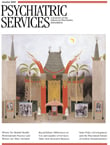Letter
Paternalism or Lack of Time?
To the Editor: In their editorial in the August issue, Drs. Drake and Deegan ( 1 ) point out the usefulness—nay, the ethical and clinical necessity—of shared decision making between patient and doctor. They ascribe the relative neglect of this imperative (there is apparently a greater level of neglect in European countries) to an ingrained and persistent "paternalism" among psychiatrists. On the basis of my 40 years of experience in community mental health services in several U.S. locations, let me suggest a possible additional, and perhaps even more influential, reason: lack of time.
Very often it takes only moments, at most a minute or two, for a doctor to run through alternatives in his or her own mind, compare them, and come to a decision about the best course to follow, especially if the doctor has already listened to the patient and elicited relevant information. However, to explain this reasoning to the patient, listen to the patient's objections and questions, and convince the patient that the doctor's choice is in the patient's best interests takes time—much more time than the doctor is "permitted" to spend with a patient by the third-party insurer.
In every system in which I have practiced, the maximum time allotted for a "medication visit" was 30 minutes, and in many places 20 or even 15 minutes was the limit. The time allotted included not only direct patient contact but also record keeping and, in one system, actually counting out and properly labeling the monthly medications handed to the patient. I might add that reductions in the time allotted per visit have pervaded not only psychiatric practice but virtually all medical encounters. Thirty-five years ago on the eve of a cholecystectomy, the anesthesiologist visited me to describe the anticipated procedures. Three decades later, I was all strapped in for surgery, IV tubes running, when a person totally unknown to me appeared at my head, partly out of sight, with the news, "I'm your anesthesiologist; do you want general or spinal anesthesia? I'd recommend the spinal." So much for informed consent (fortunately all turned out well).
Increasingly, a visit to the doctor resembles being rolled through an automatic car wash instead of a personal consultation. This is the result not of "interfering government bureaucrats" but of allegedly "freely chosen" private (and, of course, for-profit) health plans. Given such constraints, it is no wonder that doctors do the best they can in their own heads and hope that their patients will trust them—"paternalistic" as that may seem.
1. Drake RE, Deegan PE: Shared decision making is an ethical imperative. Psychiatric Services 60:1007, 2009Google Scholar



